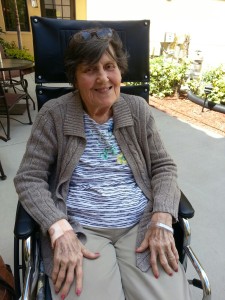 It was on Friday that the texts regarding funeral plans flooded my phone Texas-style. My poor sister-in-law was working and so didn’t retrieve any messages until her phone reported 43 new messages — many regarding my siblings’ plans for my mother’s cremation details and our subsequent “celebration of life.”
It was on Friday that the texts regarding funeral plans flooded my phone Texas-style. My poor sister-in-law was working and so didn’t retrieve any messages until her phone reported 43 new messages — many regarding my siblings’ plans for my mother’s cremation details and our subsequent “celebration of life.”
My sister-in-law scrolled through them to find the message indicating my mother had died. It was not there, but I was in tears anyway. Enough already.
A week before, my mother had complained of pain, which led to an emergency room visit, which led to a clean bill of health, well, except for the diagnosis of “dementia.” Duh. The next day, my mother complained of pain, which led to a mobile X-ray unit, which led to the revelation of a fracture to her femur, which led to another emergency room visit, which led to a series of events over three days, which led, eventually, to a diagnosis I didn’t like. A broken hip that is impossible to fix due to severe osteoporosis and arthritis.
It seemed a death sentence. My poor mother, confused by her dementia and this pain, forced into unfamiliar surroundings, bedridden?
Having lost my mother to Alzheimer’s disease years ago, I thought losing her to death would not be as painful. I was wrong.
“It is the beginning of the end,” sounded the sibling alarm, quickly followed by the initiation of funeral plans — or a celebration of my mother’s life.
I turned my phone upside down to avoid seeing the flashing blue light and text messages flashing across the screen, fighting tears and choosing, instead, to focus on work. I made plans for a weekend visit to see my mother — realizing from the week’s series of unfortunate events and the dialogue of my siblings, who live near my mother, that this likely would be the last time I ever saw her.
It would turn out to be a Mark Twain non-event.
But I drove the 2 1/2 hours to see my mother at the skilled nursing facility where she had to reside after her release from the hospital, bracing myself for the worst. I took the elevator to her floor, looking for her room number as I fully expected to find her confined to bed. As I wandered, a nurse offered assistance and proceeded to lead me out of the unit’s common living area. I chanced a glance back and saw my mother, sitting in a wheelchair, smiling and waving at me.
She didn’t call me by name, but she did seem happy to see me and told others I was her daughter, perhaps because I introduced myself as such. She chatted happily — mostly incoherently — and seemed more concerned with my comfort than her own. I gave her my best attention, trying to decipher from her conversation if she was happy or in pain or had some sort of need. At the lunch table with other memory-impaired women, she paid little attention to others, only ate when I threatened to leave if she didn’t get down to the business of eating — and then ate just a scant cup of chicken noodle soup and drank a few sips of cranberry juice before declaring herself “stuffed.” The surprisingly tantalizing ham, potatoes, carrots, and lemon bar went untouched.
I had brought my Kindle loaded with library books, my laptop, and a notepad, thinking I’d be spending the day beside her bed while she enjoyed a morphine-induced sleep, expecting her to at least nap, but my mother remained alert and talkative, seeming more lucid after a dose of pain medicine but no more sleepy.

I left after a joyous six hours, convinced that reports of my mother’s pending death were greatly exaggerated. Unlike Mark Twain, who knew of the announcement of his death and was able to verbally refute it, my mother knew nothing of the exchange of texts from the day before. But her smile and chatter and seeming good health were a good enough refutation for me. Yes, my mother’s mental and physical health had significantly declined since our last meeting, but I found her nowhere near the anticipated throes of death.
That evening, my sister brought me up to speed, explaining the emotional roller coaster of the past week and the change in my mom, who was by all accounts “rallying.” Prior to what I’d found at the facility, my mother had been bedridden and often asleep. I’d seen the rally and only experienced the roller coaster via text messaging.
After spending some time the next morning with my mother, I left for home. I sent my daughter a text, reporting that my mother was much better than I’d expected. My daughter responded:
Oh, good! It’s always nice when it’s better than expected! Maybe that’s why I’m so pessimistic. 🙂
She has a point.


One thought on “The reports of her pending death are greatly exaggerated…”